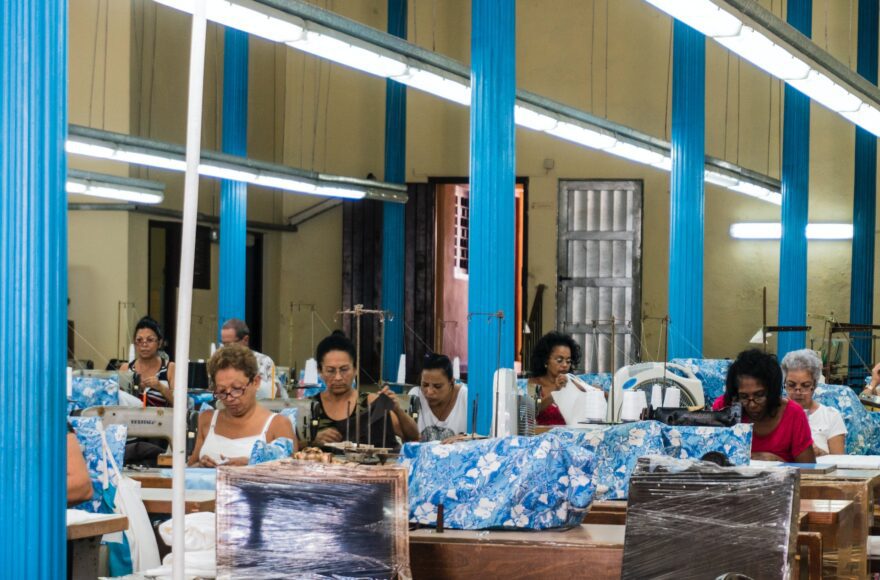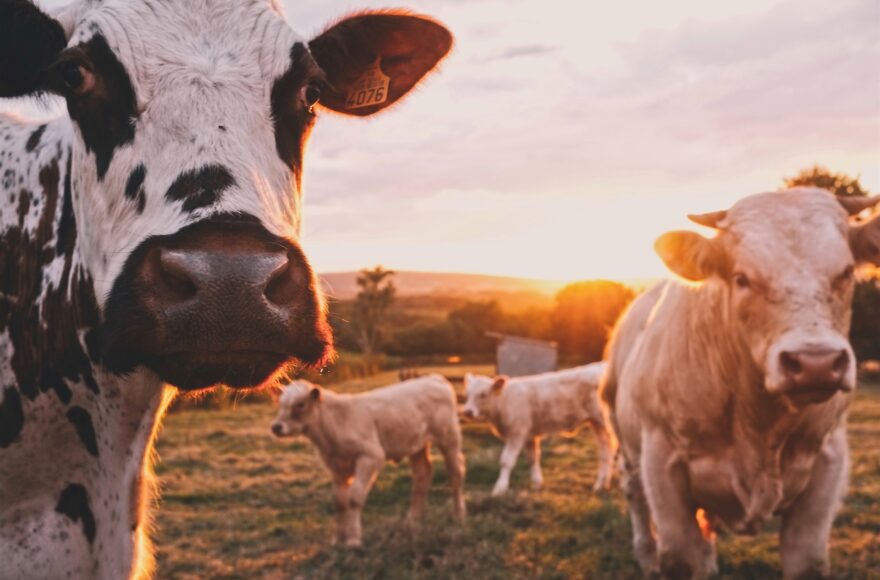Off to work we go. My mother and I.

“Teresa, is this your boy?” A large lady in her late 30s bends down to take a piece of my cheek between thumb and forefinger, giving me a slightly awkward squeeze and tweak.
“Yes,” says my mother. “Joe, say hello to Signora Concettina.”
“Hello”, I say, burying my face shyly into my mother’s coat. I am about 8 years old. We’ve just climbed the stairs to the factory where my mother makes shirts. It takes up the entire floor. Bulky, industrial sewing machines sit in line row after row.
“Look at this young man. He’s beautiful.”
“Good morning,” says my mother. “Joe, this is Signora Giovanna.” I look up shyly, acknowledging the friendly Signora with her big teeth. She sniffs at me as if she were about to eat me. I notice that everyone has an apron with a unique pattern on it. Signora Concettina has a mob of kangaroos grazing. Signora Giovanna’s apron is patterned with a garden of flowers.
“Oh, my goodness,” says another with a pattern of trains on the apron she is putting on over her head. “It’s about time we had a real man here.” She fastens the apron just above her rotund rear, then carefully ensures the frilly, white edging is not being flattened by one of the straps.
“Yes,” she repeats loudly enough so it can be heard by the men in the small office at the end of the row of machines, “a real man in our midst. And so cute.” My cheek gets another squeeze. And the men in the office look over and smile. They must have noticed that their manhood is in no danger of being surpassed or embarrassed by me.
“He is cute. Thank you, Carolina,” says my mother. “Joe say thank you to Carolina”
“Thank you.” There’s a lot of ‘thank yous’ for a little boy.
Carolina crouches down so our eyes are level. And I can see her mind constructing a future that I have no idea about. “You know, Joe, I have a young daughter about your age.” I look up at her and then around the floor, wondering if her daughter is here as well.
“You are so cute,” continues Carolina, “that one day I may let you marry her. Would you like that?” I look up from Carolina to my mother, who is smiling as her umbrella-patterned apron goes over her dress. She has not noticed the horror on my face over Carolina’s comment.
Surely, I am too young. I had come here because of the school holiday, and these women were trying to marry me off. “Don’t worry Joe, Carolina is just kidding,” my smiling mother says.
Can I relax? I am not sure. Carolina reaches out and gives me a big hug pulling me into the deep, hot space between her breasts. “If you were my boy, I would spoil you rotten.” Her voice reaches me through the muffled filter of her breasts where I have been pinned. I fear that I could suffocate if she holds me any longer or tighter.
Finally, I get a reprieve. Carolina pulls away and holding my shoulders, looks again into my eyes very earnestly and says, “You know, Teresa, my boy would be as old as Joe here?” Carolina has tears in her eyes. My mother pulls her into a gentle hug.
“Come on, Carolina, let’s go to work. Today is a happy day.” My mother looks over at me, “Isn’t it Joe?”
I just nod and follow my mother, who now has her arm in Carolina’s and is guiding her to their machines which are positioned together.
“You sit here Joe,” my mother motions to a seat next to her.
“Come on, Teresa; he will get bored sitting there all day” One of the men has come out of the office and noticed me. “You must be Joe.”
“Yes,” I responded.
“You know, your Mother has told me all about you. I reckon rather than you sit there all day and get bored, why don’t you come with me, and I’ll give you something to do.”
And so I worked. A large stack of flat box templates was placed in front of me. I was shown what to do. And there was my job. I felt like I was an adult, working and contributing. I mean, how could you send out shirts without the boxes they were to be packaged into? I was essential to the process. A part of this tight-knit 9 to 5 family of Italian migrant women and Jewish men.
The machines whirred all day as the various coloured spindles threaded thin cotton to the needles. At one end of the floor, a high stack of material was cut into indistinguishable shapes. These shapes were then handed out to the women at sewing machines who expertly stitched the shapes together.
The shirt body was built, the arms added, cuffs and collars threaded into place, and then the buttons found their way into their positions until you had a finished shirt.
It then was passed on to be ironed, folded, and placed into the boxes I had built.
At the end of the day, I received a small packet from the “boss”, as the women called him. “Thank you, Joe,” he said to me. “You can come back anytime you like.”
My mother looked into the packet and looked at the boss, “Thank you”, she said. Then looking down at me, “say thank you, Joe.” I wasn’t sure what I was being thankful for. I was tired and hungry. I looked into the small envelope my mother passed me and there was my “pay”. My first pay-packet.
It wouldn’t have paid for my wedding with Carolina’s daughter, but for me, it was a fortune.
“Thank you”, I exclaimed. “Thank you so much.”

